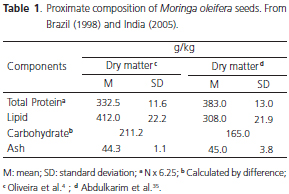This work aims to review the nutritional properties of the Moringa oleifera tree, emphasizing its main constituents and nutritional applications for humans and animals. Moringa oleifera (Moringaceae) is a cosmopolitan tree that grows in many tropical countries showing uncountable folk uses due to its various nutritional and pharmacological applications. The young leaves, flowers and pods are common vegetables in the Asian diet. All parts of this plant are renewable sources of tocopherols (γ and α), phenolic compounds, β-carotene, vitamin C and total proteins, including the essential sulfur amino acids, methionine and cysteine. The seed protein and fat contents are higher than those reported for important grain legumes and soybean varieties, respectively. Unsaturated fatty acids, especially oleic acid, carbohydrates and minerals are present in the seed in reasonable amounts. In general, there are low concentrations of antinutritional factors in the plant, although the seeds possess glucosinolates (65.5µmol/g dry matter), phytates (41g/kg) and hemagglutination activity while the leaves have appreciable amounts of saponins (80g/kg), besides low quantity of phytates (21g/kg) and tannins (12g/kg). Taking into consideration the excellent nutritional properties, the low toxicity of the seeds and the excellent ability of the plant to adapt to poor soils and dry climates, Moringa oleifera can be an alternative to some leguminous seeds as a source of high-quality protein, oil and antioxidant compounds and a way to treat water in rural areas where appropriate water resources are not available.
Protease Inhibitors; Moringa oleifera; Nutritive value

